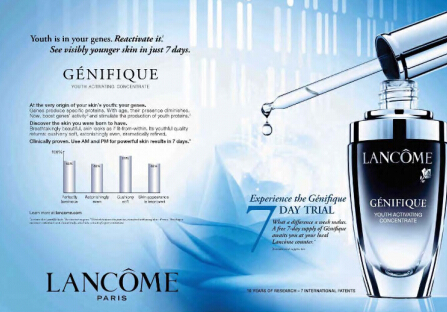
警惕广告的科学声明
Cosmetic Ads' Science Claims Lack Foundation
警惕化妆品广告的科学声明
An analysis of some 300 cosmetics ads inmagazines found the vast majority of their science claims to be either false ortoo vague to judge
一项研究分析了各类杂志上的的300多份化妆品广告,结果发现它们大多数的科学声明要么是虚假的,要么太模棱两可难以判断。
撰文/播音 埃里卡·贝拉斯(ErikaBeras)
翻译 王娇娇
审校 徐丽 李轩
“Clinically Proven.” “BreakthroughTechnology.” “Ten Years of Genetic Research.” These are phrases you mightexpect to find in the pages of Scientific American. But these descriptions alsoshow up in commercials and print ads for cosmetics.
“临床证明”、“重大科技突破”、“专注基因研究十载”,你可能觉得这些标语应该出现在《科学美国人》的页面上,但是这些描述也同样常见于化妆品的广告和宣传册上。
Now a study finds that some—well, make thata lot—of those science-sounding claims are simply not true.
如今,一项研究发现,其中一些——其实是大多数——冠冕堂皇的科学声明根本就不是真的。
Researchers looked at nearly 300 ads inmagazines such as Vogue. They analyzed claims in the ads and ranked them on ascale ranging from acceptable to outright lie. And they found that just 18percent of the boasts that the researchers looked at were true. 23 percent wereoutright lies. And 42 percent were too vague to even classify. The study is inthe Journal of Global Fashion Marketing. [Jie G. Fowler, Timothy H. Reisenwitzand Les Carlson, Deception in cosmetics advertising: Examining cosmeticsadvertising claims in fashion magazine ads]
研究者在诸如《时尚》(Vogue)这样的杂志上收集了近300份广告,将它们按照“可接受”到“彻底的谎言”这样的级别进行排序分类,发现在这些广告中只有18%的自我吹捧是真的,而其中的23%是彻头彻尾的谎言,还有42%则表述模糊而难以界定。这项研究结果发表在了Journal of Global FashionMarketing期刊上. (Jie G. Fowler, Timothy H. Reisenwitz and Les Carlson, Deception incosmetics advertising: Examining cosmetics advertising claims in fashionmagazine ads)
The Food and Drug Administration regulateswhat goes into your cosmetics and what goes on the label. If a claim isblatantly untrue, the FDA can take action. Vague language on labels may be away to keep the FDA at bay.
美国食品与药物管理局(FDA)负责规定什么成分能添加到化妆品中,也负责规定什么描述能出现在标签上。如果一个声明公然与事实不符,那么FDA就将采取行动。因此,标签上模棱两可的语言成了一个避开FDA监管的好法子。
Meanwhile, ads are regulated by the FederalTrade Commission. Just last year they charged L’Oreal for deceptive advertisingof its Génifique products, which the company said were “clinically proven” toboost genes’ activity that would lead to the production of proteins causing“visibly younger skin in just seven days.” A settlement agreement forcedL’Oreal to back off on the claims.
同时,广告还受制于美国联邦贸易委员会(Federal Trade Commission)。就在去年,委员会控告了欧莱雅公司的兰蔻精华肌底液(小黑瓶)的欺骗性广告,同时强制撤销了此产品的相应广告声明。欧莱雅在声明中宣称,临床证明,该产品可以激活基因活性,合成肌肤中的年轻蛋白,使用7天就能使肌肤细腻透亮、明显年轻。
So take those cosmetic ads with a grain ofthat salt scrub—after all, if scientists had really come up with a product thatreversed your wrinkles or grew your eyelashes, it would sell itself.
所以是该给这些化妆品广告洗洗磨砂浴了,去除它们浮夸的科学声明。毕竟,如果科学家们真的研制出一款能抚平皱纹和纤长睫毛的产品,让产品说话,它们自己会推销自己。
未经书面许可任何人不得复制或镜像
京ICP备11000850号-1
 京公网安备11010502039775号
京公网安备11010502039775号 信息网络传播视听节目许可证0111611号
国家科技基础条件平台

















